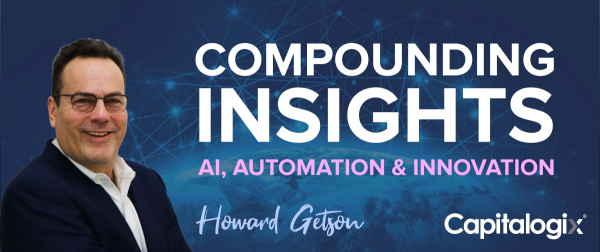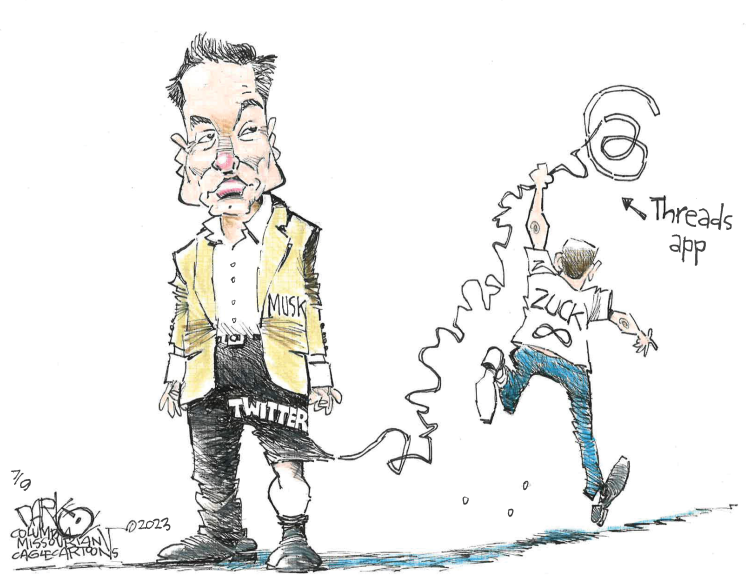I'm launching a new newsletter - with a twist. The newsletter will be fully automated and produced by an AI we are training to pick out the articles to highlight and share.
Don't Let the Past Get In the Way of the New.
Even though a lot of what I think and write about is innovation, exponential technologies, and automation ... until now, what we write and send has been the result of human effort rather than artificial intelligence or technology.
Sure, portions of the process leverage technology ... but humans have written the vast majority of what you read here.
It takes many hours a week. Frankly, many more hours than you would guess!
Still, I enjoy working on the Weekly Commentary and the list of links that I share. It is a labor of love (or OCD?) that I have been producing for about twenty years!
If you aren't a subscriber yet, please click here to get it!
We currently send out two weekly e-mails. The one that comes out on Fridays is a hand-curated list of links that I found interesting during the week. The Sunday edition has two articles written by me and my son, Zach, along with a few more links.
Deep down, I know that AI is now good enough to curate a high-quality list of articles in a more efficient, effective, and certain way than what I produce.
So, we are about a week away from launching this.

This is my John Henry Versus The Machine.
And I'll tell you what – I'm worried.
The new AI-generated newsletter is really good.
Why Play a Losing Game?
I know that I will lose ... But I also know that I will win. And so will you!
This does not have to be an "either-or" decision. This is a "both-and" decision. Meaning ... I don't have to decide whether to stop producing by hand, in order to also produce with AI.
One of the challenges with AI is that the fitness function you choose significantly impacts the result you achieve.
If the purpose of the newsletter was only to produce a quality newsletter in less time, with less effort, and with greater certainty that readers engage ... then the result is inevitable. The AI newsletter wins.
However, I didn't choose to produce the newsletter for the newsletter. The newsletter is a natural result of my nature. I did the research because I wanted to do the research.
I am naturally curious and passionate about these things. It's what I think about. It's who I am ... and what I do.
The Weekly Commentary and Link List are strategic byproducts of something that I'm going to choose to do anyway,
AI Won't Replace the Real Magic.
One of my beliefs about AI is that you shouldn't use it to replace your Unique Ability. In other words, don't try to automate, delegate, or outsource something you are great at, if it gives you energy. The goal is to magnify "magic," not replace it. The goal is to spotlight and support those areas by taking away things that are frustrating, bothersome, distracting, or taking cycles away from something that would produce a greater result with less energy.
The point is, I can do both. I will still do research because it gives me pleasure, knowledge, and a greater likelihood of continuing to learn and grow. I will continue to write and curate.
Why? Because it's also an important part of my thinking process. I think when I speak. I think when I write. But more importantly, I think when I am preparing to speak or write. I wouldn't be me if I didn't go through that process. I also don't believe my ideas or opinions would continue evolving without the challenge and effort.
And I will also enjoy evolving new and different channels of communication.
Hopefully, we all benefit.
So, I hope you sign up for the new newsletter. We'll be sending out the first e-mail within the next week or two.

As I've said, I love writing and researching. I'm an innovator at heart.
Many read my articles because of my commitment to AI, new technologies, and the future. Most of my exploration has been centered on Capitalogix and our Amplified Intelligence Platform. But there are a lot of exciting new use cases of AI, and I'm exploring many of those apps right now.
For example, as you could have guessed, one such use that I'm excited about is AI-curated newsletters. Many people I trust and respect have started using Daily.AI, including Peter Diamandis, Dan Sullivan, Joe Polish, and Chris Voss. It's clearly a successful modality.
A Thousand Mile Journey Starts With a Single Step.
Hopefully, you are excited about the new newsletter and the value you will get from it.
I'm confident it will only improve – because it learns from what you value.
To start, the newsletter will focus on these three topic areas:
- How to build a resilient business in a fast-changing world
- The Psychology of technology & technology addiction
- Business ethics and AI ethics in today's world.
But that is just the starting point. It is set up to consider the same type of offshoots as I normally would. So, it will remain diverse and educational.
Please sign up and let me know what you think about it.


Cognitive Biases & The Consequences of Labeling
Continuing with the theme of cognitive biases, the upcoming election has me thinking about the consequences of labeling things, creating boxes, and simplifying ideas into news-ready headlines.
With more news sources than ever and less attention span, you see ideas packaged into attention-grabbing parts. The focus isn't on education or the issues, but on getting the click, making your stay on their page longer, and sending you to a new article utterly unrelated to why you clicked on the page.
Complex issues are simplified – not even into their most basic forms – but instead into their most divisive forms ... because there's no money in the middle.
via Quote Investigator
The amplified voices are those on the fringe of the average constituents' beliefs – precisely because those are the ones who are often the most outspoken. We might think that because they're the voices we hear, these fringe messages fairly represent what people like us believe or think ... but they rarely do.
Issues that should be bipartisan have been made "us" versus "them," "liberal" versus "conservative," or "right" versus "wrong." The algorithms many of our information sites use create echo chambers that increase radicalization and decrease comprehension.
Identity politics have gotten so strong that you see families breaking apart and friend groups disintegrating ... because people can't imagine sharing a room with someone with whom they don't share the same values.
In psychology, heuristics are mental models that help you make decisions easier. They're a starting point to save mental bandwidth, allowing you to spend more brain cycles on the important stuff.
That's a great use of "boxes" and "simplification"… but it shouldn't eliminate deeper and more nuanced thought on important issues.
Most situations are nuanced, and the "correct" answer changes as you change your vantage point.
In an ideal world, we'd consider every angle. I recognize that's not realistic.
Instead, I encourage you to remember to continue to think and learn ... even about things you already know. And, if you become familiar with the most common cognitive biases, you can hopefully identify them in your thinking and decision-making.
Confirmation Bias is one of the more common forms of cognitive bias. Here is an infographic that lists 50 common cognitive biases. Click to explore further.
via VisualCapitalist
Important issues deserve more research. New insights happen between the boundaries of what we know and don't. Knowledge comes from truly understanding the border between what you are certain and uncertain about.
I challenge you to look beyond the headlines, slogans, and talking points you like most. Look for dissenting opinions and understand what's driving their dissent. Are they really blind or dumb (or are their value systems just weighted differently)?
Not everything needs to be boxed. Not everything needs to be simple. You should explore things and people outside of your comfort zone and look to see things from their point of view ... not your own.
Recently, I've started using a website and news app called Ground News. They claim to be a news platform that makes it easy to compare news sources, read between the lines of media bias, and break free from algorithms.
As discussed above, online news and ad-driven algorithms have made it profitable for news outlets to embrace a position on the bias spectrum to target specific consumers. That bias in the media affects everything from what events receive coverage to how a news outlet frames those events in their reporting.
As media outlets narrow their perspective and range of coverage, I use Ground to help me get a well-rounded view of important issues and become aware of my blind spots.
Applying This Lesson
I love learning a lesson in one space and applying it to other spaces. It's one of the cool things about AI. An algorithm can learn rules in the construction space that may help in the medicine or trading space. Everything's a lesson if you let it be.
In that vein, the lesson on labeling also applies to yourself and your business. Don't get me wrong - naming things is powerful. It can help make the intangible tangible. However, don't let the label (or your perception of the label) stop you from achieving something greater.
Many things are true because we believe them to be, but when we let go of past beliefs, the impossible becomes possible, and the invisible becomes visible.
Hope that helps.
Posted at 09:37 PM in Books, Business, Current Affairs, Film, Ideas, Market Commentary, Personal Development, Religion, Science, Television, Trading, Trading Tools, Web/Tech, Writing | Permalink | Comments (0)
Reblog (0)